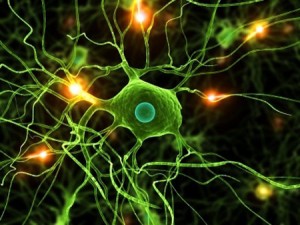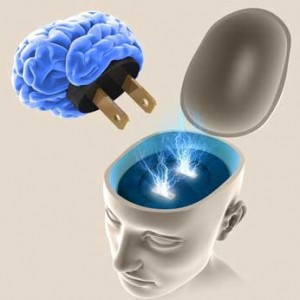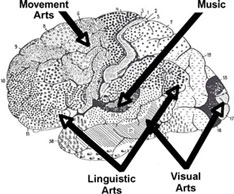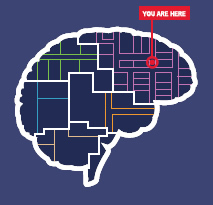Stimulate Your Photosensitive Brain
 A group of researchers in Finland have demonstrated that our brain is photosensitive. Brain function changes when you shine light on it. Their research has shown that brain light therapy can improve cognitive function, mental energy and mood. The effects seem significant and long lasting.
A group of researchers in Finland have demonstrated that our brain is photosensitive. Brain function changes when you shine light on it. Their research has shown that brain light therapy can improve cognitive function, mental energy and mood. The effects seem significant and long lasting.
You can shine light directly on some of the photosensitive regions of your brain through the ear canal. A consumer product, Valkee, does exactly that with light-emitting ear plugs. According to the researchers you need to use it for 10 minutes a day to see results.
Interested to hear from readers that have used the Valkee or some other form of light-based brain stimulation.
Categories: Other Tags:
Seek Novelty to Expand Cognitive Potential
 In the Next Brain blog we explore evidence-based ways to improve brain function and enhance cognitive performance. That is why the recent article in Scientific American on 5 Ways to Enhance your Cognitive Potential caught my eye. The author does a good job of reviewing the science behind fluid intelligence and argues we can actually increase IQ through targeted development efforts. There are five ways that include seek novelty, challenge yourself, think creatively, do things the hard way and network. Let’s take a closer look at seeking novelty or being open to new experiences. It is a practice with a clear impact on our brains (plasticity, dopamine for motivation, etc.) and you can build into into everyday activities.
In the Next Brain blog we explore evidence-based ways to improve brain function and enhance cognitive performance. That is why the recent article in Scientific American on 5 Ways to Enhance your Cognitive Potential caught my eye. The author does a good job of reviewing the science behind fluid intelligence and argues we can actually increase IQ through targeted development efforts. There are five ways that include seek novelty, challenge yourself, think creatively, do things the hard way and network. Let’s take a closer look at seeking novelty or being open to new experiences. It is a practice with a clear impact on our brains (plasticity, dopamine for motivation, etc.) and you can build into into everyday activities.
The authors recommend:
“Always look to new activities to engage your mind—expand your cognitive horizons. Learn an instrument. Take an art class. Go to a museum. Read about a new area of science.”
Learning an instrument and taking an art class are excellent suggestions as they have proven effects on building a number of cognitive skills. We have discussed this elsewhere on the Next Brain Blog. See for example Music Lessons Offer Life Long Cognitive Benefits.
Learning art or music is a big investment. What else can we do?
 One of my favorite ways to stimulate novelty is to review web sites on topics outside my normal areas of interest. YouTube videos and Ted Talks can really get the novelty factor flowing fast.
One of my favorite ways to stimulate novelty is to review web sites on topics outside my normal areas of interest. YouTube videos and Ted Talks can really get the novelty factor flowing fast.
For example, watch the first 4 minutes of the video below on brain magic. Be sure to follow along with the audience. I guarantee you will get a good jolt of novelty!
Interested to hear from readers that have made novelty seeking a habit. What specifically do you do?
Categories: Other Tags:
Can Pulsed Light-and-Sound Enhance Your Brain?
 The idea behind mind machines is intriguing. They are simple devices that use pulsed sound and light to trick your brainwaves into certain patterns and put you in specific mental states such as relaxation or alertness. The question is do they really work?
The idea behind mind machines is intriguing. They are simple devices that use pulsed sound and light to trick your brainwaves into certain patterns and put you in specific mental states such as relaxation or alertness. The question is do they really work?
There is some scientific evidence that brainwave entrainment can have a therapeutic impact. There are a handful of small companies that manufacture and have sold mind machines for decades. Yet they remain on the fringe.
While I am not endorsing any specific product or company, you can learn more by checking out this video by the folks at Mind Alive. One of their mind machines (pictured to the right) runs about $500.
In the video they talk about how this technology delivers a “made to order mental state”. They also emphasize that given its ability to help manage stress it should be in every home. Perhaps if we had an iPhone or Droid app that turns a smart phone into a mind machine that will happen.
Very interested to hear from readers that use some form of mind machine. How long have you used it? What effects does it produce?
Categories: Mental Focus, Music and Audio, Other, Sleep Tags: Brainwave Entrainment
Learning Self Control Early Drives Success
 Developing Your Next Brain, or making an effort to improve brain function and reach peak cognitive performance takes a lot of work. One reason we do it is to live a more successful life. While life success has many facets most agree that a cornerstone is self control. Being able to shape our own thinking and emotional responses, manage impulses, avoid self defeating assumptions and persistence in the face of obstacles is critical to living the good life. This has little to do with IQ and a lot to do with your ability to manage yourself.
Developing Your Next Brain, or making an effort to improve brain function and reach peak cognitive performance takes a lot of work. One reason we do it is to live a more successful life. While life success has many facets most agree that a cornerstone is self control. Being able to shape our own thinking and emotional responses, manage impulses, avoid self defeating assumptions and persistence in the face of obstacles is critical to living the good life. This has little to do with IQ and a lot to do with your ability to manage yourself.
There is considerable evidence to support this claim. Take for example, the recent research reported in Science News that suggests:
Good self management skills as early as age three predict health and wealth in adulthood.
The findings are dramatic:
“Low levels of conscientiousness, perseverance and other elements of self-control in youngsters as young as age 3 herald high rates of physical health problems, substance abuse, financial woes, criminal arrests and single parenthood by age 32, says an international team led by psychologists Terrie Moffitt and Avshalom Caspi of Duke University in Durham, N.C.”
How can children develop higher levels of self-control? Research from another group reported in the article claimed behavioral rewards, developing coping skills and role playing simulation using videotape are key. None of this is rocket science. For example, coping skills can include blowing bubbles and making funny faces. The rub is to learn to do these things rather than getting angry or stressed and yelling at others or giving up on a goal.
Very interested to hear from readers that have experience with specific techniques for improving self control and self management skills in children.
Categories: Child, Executive Function, Manage Emotions, Other, Training Tags: EQ, experiential learning
Low Dose Electrical Current Boosts Creativity
 Our thinking and decision-making is strongly shaped by what has worked in the past. Success is compiled into rules and mental sets that make us more efficient but also blind us to innovative alternatives. If we could safely disrupt the applications of mental sets at the right time we might enhance our creativity. That idea was recently tested using transcranial direct current stimulation (tDCS) by researchers at the Center for the Mind.
Our thinking and decision-making is strongly shaped by what has worked in the past. Success is compiled into rules and mental sets that make us more efficient but also blind us to innovative alternatives. If we could safely disrupt the applications of mental sets at the right time we might enhance our creativity. That idea was recently tested using transcranial direct current stimulation (tDCS) by researchers at the Center for the Mind.
The experiment involved 60 subjects that were given a creative problem to solve. Some received a small electrical current applied to their brain in a region thought to hold mental sets that guide our problem solving. The results were dramatic:
“Only 20% of participants solved an insight problem with sham stimulation (control), whereas 3 times as many participants did so…”
A strong effect but one that needs to be repeated and further explained using brain scanning studies.
Only a tiny amount of electrical current is being used in tDCS. It has been the focus of other studies designed to enhance cognitive performance. We covered one from Oxford University in an earlier post on the Next Brain Blog.
I am interested to hear from readers about how low-level direct current is being used to stimulate cognitive performance.
Categories: Other, Problem Solving Tags: cognitive bias, experiential learning, tDCS
Can Specific Scents Boost Cognitive Performance?
 Scents and odors have a swift and powerful impact on our brains. They can trigger memories and moods and signal the intentions and feelings of others. But can specific scents be used to improve our brain function and cognitive performance?
Scents and odors have a swift and powerful impact on our brains. They can trigger memories and moods and signal the intentions and feelings of others. But can specific scents be used to improve our brain function and cognitive performance?
There are scientific studies that suggest the scent of vanilla, cinnamon, roses and peppermint impact attention, memory and mental energy.
For example, a recent study in the North American Journal of Psychology pointed out:
“Past research indicates the odors of peppermint and cinnamon (1) enhance motivation, performance, and alertness, (2) decrease fatigue, and (3) serve as central nervous system stimulants.”
I could not find many scientific studies. The impacts they measure are not large or sustained.
There are also some suggested uses of odor in brain training, especially in the approach called neurobics. For example, in the book Keeping Your Brain Alive, the authors suggest:
- Wake up and smell the vanilla: Release the smell of an extract (vanilla, citrus, peppermint or rosemary) just as you awake every morning for a week.
- The scent of music: Sniff specific odors while listening to a song to stimulate novel sensory associations in your brain.
Scent can be delivered from simple cotton balls, plug-in devices, sprays or oils spread by small fans in low-cost electric aromatherapy diffusers. This makes it relatively easy to experiment with scents and cognitive performance. For example, scenting a room while studying, taking sniffs of specific scents just before or after a mental task and so on.
Interested to hear from readers that use scent to boost performance or as part of a brain training routine.
Categories: Memory and Learning, Mental Focus, Other Tags: scents
The Science of Building a Better Brain
 Newsweek did a great job of summarizing the findings from the cognitive enhancement strategies workshop held at the 2010 annual meeting of the Society of Neuroscience. The article, Can You Build a Better Brain? uses the latest neuroscience to differentiate between techniques that work and those that don’t. Techniques for improving brain function and enhancing cognitive performance that have strong scientific support include:
Newsweek did a great job of summarizing the findings from the cognitive enhancement strategies workshop held at the 2010 annual meeting of the Society of Neuroscience. The article, Can You Build a Better Brain? uses the latest neuroscience to differentiate between techniques that work and those that don’t. Techniques for improving brain function and enhancing cognitive performance that have strong scientific support include:
- Drugs that boost dopamine levels such as caffeine
- Regular aerobic exercise
- Meditation training
- Activities that boost mood and confidence
- Action-oriented video games
- Cognitive training software but only for the tasks done using the software
All of these techniques have been covered in the Next Brain Blog. Techniques that don’t appear to have strong evidence include, and I quote:
“Vitamins B6, B12, and E; beta carotene; folic acid; and the trendy antioxidants called flavenoids are all busts, and the evidence for alcohol, omega-3s (the fatty acids in fish), or having a large social network is weak. The Mediterranean diet is associated with a lower risk of cognitive decline, find observational studies, but that hasn’t been confirmed in more rigorous, randomized controlled studies, and no one knows whether the benefit comes from what the diet includes (olive oil, fish, vegetables, wine) or what it excludes (red meat, refined sugars, dairy fat). Statins don’t help, and neither do estrogen or NSAIDs (aspirin, ibuprofen).”
Although some of these have supporting studies they lack a clear causal connection to brain plasticity or other currently understood mechanism of cognition.
Categories: Other Tags: brain training, exercise, games, meditation, mindfulness, Mindset, vitamins
How Arts Training Makes You Smarter
 The Dana foundation funded a three-year study involving cognitive neuroscientists from seven leading universities to figure out if training the arts makes us smarter. The results, published in Learning, Arts and the Brain, are important for those interested in specific techniques for improving brain function and cognitive performance.
The Dana foundation funded a three-year study involving cognitive neuroscientists from seven leading universities to figure out if training the arts makes us smarter. The results, published in Learning, Arts and the Brain, are important for those interested in specific techniques for improving brain function and cognitive performance.
Training in the arts does make us smarter:
- Learning performance arts in general improves capacity for mental focus and attention
- Studying acting improves memory function
- Studying dance improves observational skills
- Practicing music improves geometric reasoning skills
No real surprises here but the research uncovers the mechanisms at work and separates claims of cause and effect from correlations. In previous posts on the Next Brain Blog we discussed the powerful cognitive development effects of learning to play an instrument.
Interested to hear from readers that train in the Art and believe they get a brain boost from it.
Brain Challenge HD on Sale for Only $0.99
iPhone and iPad users can get Brain Challenge HD at a discount. If you like this brain teasing approach be sure to check out Brain Challenge 2, 3 and 4 by Gameloft.
Categories: Cognitive Decline, Memory and Learning, Other, Software Tags: games
World’s Top Brain Experts Confirm Techniques for Enhancing Cognitive Performance
 Once every 10 years a special conference is held to explore what we know about the cognitive neuroscience of our brain’s frontal lobes. The conference is called The Frontal Lobes and was held last week. Progress over the last 10 years has been tremendous:
Once every 10 years a special conference is held to explore what we know about the cognitive neuroscience of our brain’s frontal lobes. The conference is called The Frontal Lobes and was held last week. Progress over the last 10 years has been tremendous:
Drs. Stuss and Knight are world-renowned frontal lobes experts who produced the last global conference on the frontal lobes 10 years ago in Toronto. They say the last decade has been a gold mine of new knowledge and given rise to emerging fields such as social neuroscience, neuroeconomics, neuroscience and the law, neuromarketing, neurodevelopment and neurorehabilitation.
Of special interest to readers of the Next Brain Blog is the focus on techniques for improving cognitive performance. A post on the conference blog, We can enhance cognitive performance in later years!, provides a nice review of techniques that have scientific support. These include:
- Intensive cognitive training
- Playing video games
- Aerobic exercises
- Delaying retirement or staying mentally active after retirement
In addition, cognitive decline with age is not as inevitable as once thought. Some studies showed variability among individuals and even some cases of spontaneous reversal
“Dr. Lars Nyberg (Umea University, Sweden), a former post doc at the Rotman Research Institute – presented data from a large study that has followed the physical and cognitive health of over 4,000 adults aged 35 – 80 years during a two-decade period to see when brain failure starts to show. He found that the decline starts gradually around the mid 30s and then nose-dives around 60-65 years of age. But if there is a silver lining here, it is that all older adults are not alike in this trajectory. Studies have found variability of cognitive performance. In fact, there have been “rare” cases of spontaneous positive reversals of decline in this age group.”
These techniques and points of view have been covered elsewhere in this blog. The Frontal Lobes conference provides impressive scientific support for believing we now have the know-how, technologies and supplements for enhancing our cognitive performance and developing more resilient and longer-lasting brains.
Categories: Other Tags:

